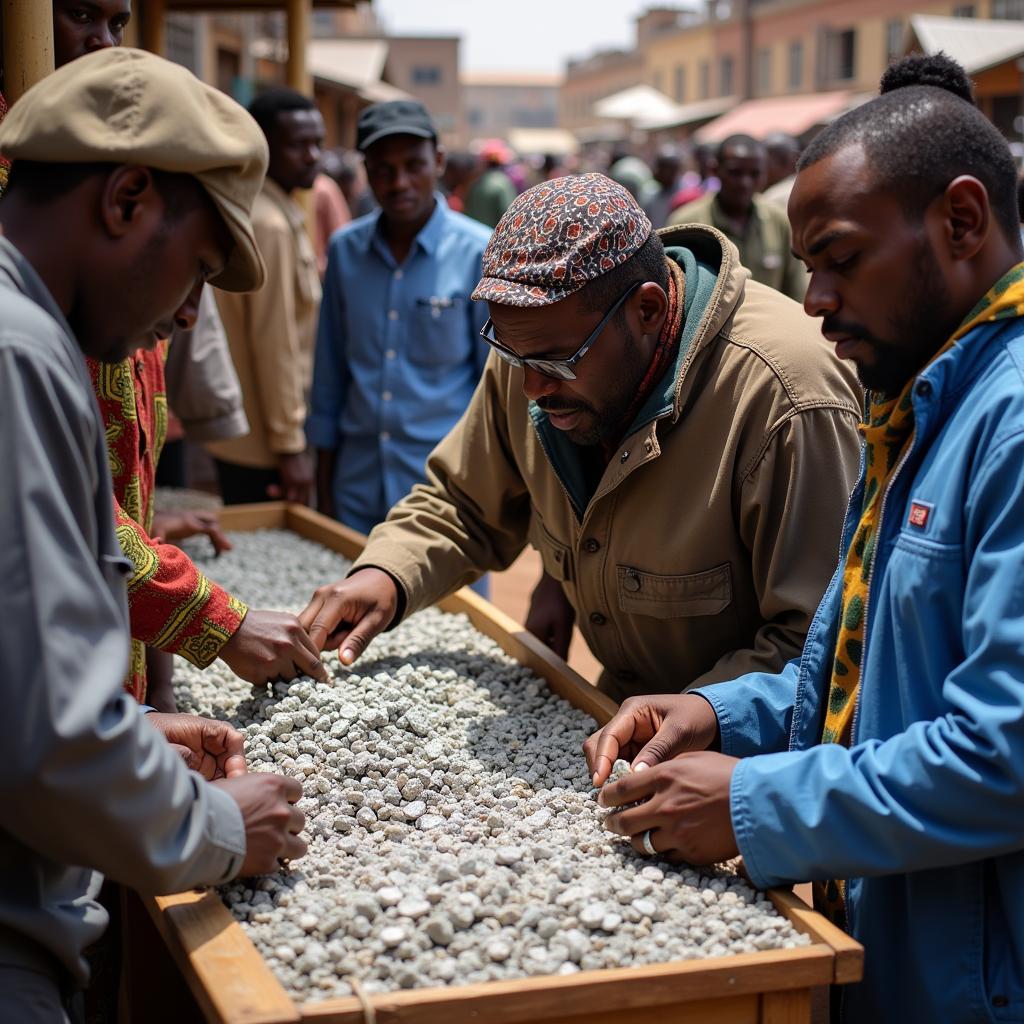The African Diamond Company industry shines bright, representing a fascinating blend of natural resource wealth and economic opportunity. For centuries, Africa has been synonymous with diamonds, these precious stones being inextricably linked to the continent’s history, culture, and development.
Diamonds of Africa: More Than Just Gems
Beyond their dazzling beauty, diamonds from African diamond companies hold significant weight. They are a source of livelihood for millions, fuel economic growth, and contribute to the development of infrastructure, education, and healthcare initiatives across the continent. However, the story of African diamonds is not without its complexities. Understanding the dynamics of the African diamond company landscape requires delving into its past, acknowledging its present, and looking towards a future where these precious stones can be a catalyst for sustainable and equitable prosperity.
 African Diamond Mine
African Diamond Mine
A Legacy Etched in Stone: History of African Diamond Companies
The discovery of diamonds in South Africa in the late 19th century marked a turning point. It spurred a diamond rush, attracting prospectors and entrepreneurs, and leading to the establishment of some of the first African diamond companies. These early ventures, often characterized by colonial influence and control, shaped the industry’s trajectory for decades to come.
The legacy of colonialism cast a long shadow, with the benefits of diamond wealth often failing to trickle down to local communities. However, the post-colonial era witnessed the rise of African-owned and operated diamond companies, signifying a shift in power dynamics and a move towards greater self-determination within the industry.
 African Diamond Traders
African Diamond Traders
Navigating the Terrain: The Modern African Diamond Company
The contemporary African diamond company landscape is a tapestry woven with both challenges and opportunities. The industry is evolving to address concerns over ethical sourcing, transparency, and environmental responsibility. The Kimberley Process, established in 2003, represents a global effort to stem the flow of conflict diamonds, aiming to ensure that diamonds contribute to peace and development rather than fueling violence.
Many African diamond companies are embracing sustainable mining practices, investing in community development programs, and prioritizing environmental conservation. They are increasingly aware that their long-term success hinges on operating responsibly and contributing positively to the well-being of their workforce and the communities in which they operate.
Looking Ahead: The Future of African Diamond Companies
What does the future hold for African diamond companies? The industry stands at a crossroads, presented with a unique opportunity to redefine itself as a force for good. Technological advancements, shifting consumer preferences, and a growing demand for transparency are reshaping the global diamond market.
African diamond companies are well-positioned to capitalize on these trends by embracing innovation, fostering ethical practices, and showcasing the unique origins and stories behind their diamonds. By championing sustainability and social responsibility, African diamonds plc can solidify their position as leaders in a changing world, ensuring that diamonds continue to be a source of pride and prosperity for generations to come.
Frequently Asked Questions about African Diamond Companies
1. What is the Kimberley Process?
The Kimberley Process is an international certification scheme implemented in 2003 to prevent the trade of conflict diamonds. It requires participating countries to implement strict controls and certification systems to track the origin of rough diamonds.
2. Are all diamonds mined in Africa conflict-free?
No, not all diamonds mined in Africa are automatically conflict-free. However, the Kimberley Process and efforts by responsible African diamond companies have significantly reduced the trade of conflict diamonds. When purchasing diamonds, it’s crucial to ask for a Kimberley Process certificate and inquire about the ethical sourcing practices of the seller or company.
3. How are African diamond companies contributing to sustainable development?
Many African diamond companies are embracing sustainable mining practices, such as reducing water and energy consumption, minimizing waste, and restoring mined-out areas. They are also investing in community development projects, providing healthcare and educational opportunities, and supporting local infrastructure.
4. What is the role of technology in the African diamond industry?
Technology is playing an increasingly important role in the African diamond industry. From exploration and mining techniques to diamond cutting and polishing, technological advancements are improving efficiency, transparency, and sustainability across the value chain.
5. How can I make sure my diamond purchase is ethical?
When buying a diamond, ask for a Kimberley Process certificate, research the company or seller’s ethical sourcing policies, and look for certifications from organizations like the Responsible Jewellery Council.
Need More Information?
For further insights, explore these resources:
Contact us for personalized support and discover the captivating world of African diamond companies.
Phone: +255768904061
Email: [email protected]
Address: Mbarali DC Mawindi, Kangaga, Tanzania.
Our dedicated team is available 24/7 to assist you.
Leave a Reply